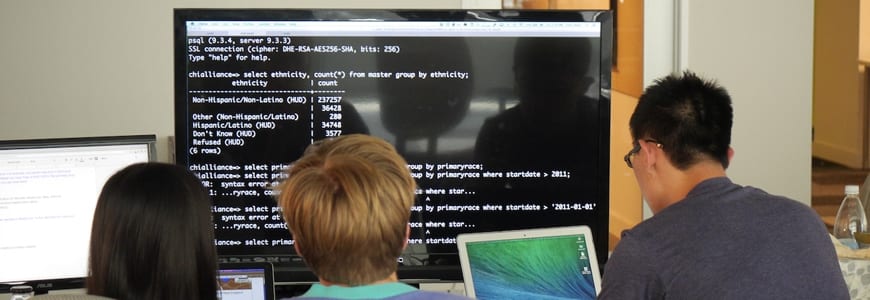By Rob Mitchum // February 9, 2015
When people talk about the current tech boom, it usually conjures up images of phone apps, social media networks, and startups with one-word names. But inside the public sector, a quieter tech revolution stirs, as governments increasingly recognize the power of data to help them serve their constituents more effectively. This trend creates a new kind of skills gap, as governments look for people with both the technical skills and civic motivation to analyze data and build tools for internal and external use.
In a story for Motherboard, Vice’s technology channel, reporter Theresa Bradley examines this situation and looks at programs attempting to fill this gap, including the CI’s Data Science for Social Good Summer Fellowship. In addition to photos and graphics from DSSG (who are currently sorting through some 800 applications for 2015!), Bradley spoke to director Rayid Ghani about his inspiration for starting the fellowship.
To introduce techies to other options, Ghani in 2013 launched Data Science for Social Good, a summer fellowship at the University of Chicago that has since drawn more than 80 statisticians, engineers, mathematicians and others to help nonprofits and public agencies from the World Bank to the City of Memphis address issues like corruption, homelessness, climate change, and blight—opening their minds to public sector possibilities along the way.
“I wanted them to be exposed to these kinds of problems, so when they hear a technical idea, they say, ‘Oh, that could be really useful for that organization that’s doing disaster-relief work’ or something, so they make that link and pursue it” over commercial applications, Ghani said.
Bradley also spoke to Urban Center for Computation and Datafellow Brett Goldstein, the former Chief Data and Information Officer for Chicago, about what’s needed to train new people that can extract the maximum potential from government data.
“If we’re going to create data-empowered individuals as change agents in government, they need to have depth,” to be able to interrogate not just data, but the range of ways in which it can be used, said Goldstein, who introduced many of these methods to the City of Chicago.
“We need to break down these classical silos,” he added. “The government worker, the policy person, the social scientist of the future, needs to have subject matter expertise, and at the same time have the applied data science skills to do real work on their own. And they need to understand what they’re doing.”
For more information about Data Science for Social Good, visit their website or read this feature article about last summer’s program.

